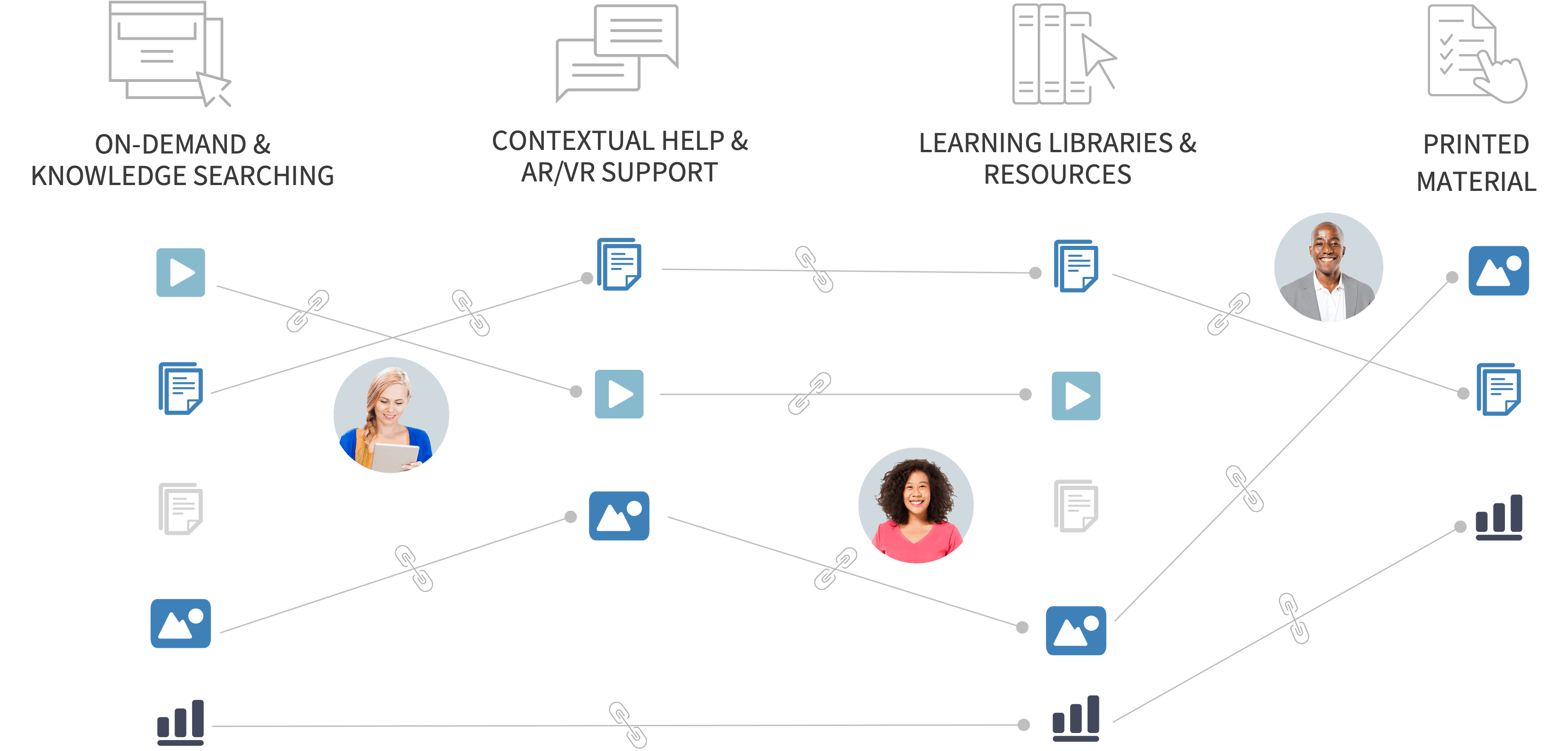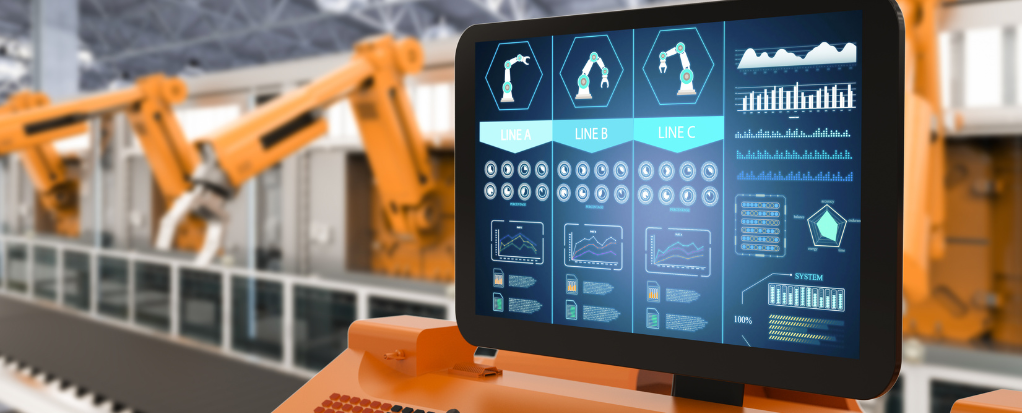The power of automation, combined with content intelligence, has the potential to deliver individualized content and drive continuous learning and productivity. But is it possible to execute individualized, skills-based learning at scale?
The Challenge of Scalable, Individualized Learning
Truly individualized learning paths are omnichannel and multi-experience. Learning interventions must be designed as a system that works in concert to reinforce and support the learner in many different contexts. This concept has yet to be effectively implemented at scale.
The Role of a Learning Content Management System (LCMS)
Most organizations lack the tools to effectively support this new world. Xyleme LCMS is designed to digitize your content operations so you can deliver content to match the speed, scale, and ambitions of the business. Orchestrating individualized learning at the scale requires a new level of content management. Content must be delivered to and tailored to fit the needs of many different platforms. The content needs to work together to reinforce and drive retention and feel cohesive. It also needs to be kept up-to-date and in sync.
This level of orchestration will require L&D to break down silos between content teams and merge the development of classroom, self-paced, and performance support into a cohesive campaign designed from a single Body of Knowledge (BOK) to work together.
The BOK needs to be format-agnostic and easily manipulated by scripts, so it can be transformed into the required learning experiences. Marketing has been manipulating and transforming content this way for years with the aid of structured authoring and component content management systems, and now L&D needs to do the same.
However, there are notable differences between marketing and L&D, which is why learning teams need a Component Content Management System (CCMS) for Learning which is often shortened to a Learning Content Management System (LCMS) – like Xyleme.
The Power of Intelligent Content
Content—which starts out simply as the words, images, explanations, processes, procedures, labs, assessment questions, discussions, activities, and more—is captured in structured XML so it can be used across all the learning experiences. This includes any format from classroom to self-paced to performance support.
To empower people with the skills they need, as they need them, they must be able to learn on the go—and content needs to be intelligent enough to support them. In 2015 Ann Rockley defined intelligent content as “content that’s structurally rich and semantically categorized and therefore automatically discoverable, reusable, reconfigurable, and adaptable.”
This premise successfully fueled the marketing transformation and should do the same for L&D.
Intelligent content is:

modular content blocks
- Created in modular building blocks
- Tagged with metadata, following a well-defined taxonomy
- Created and stored without formatting
- Published to multiple channels and formats
Intelligent content can and should be used to power personalized experiences. It can be reused across teams to do so. In this way, LOBs can:
- Manage priorities and content teams
- Create content tailored to their audiences and needs
- Distribute where and how they need it (leveraging central technology)

content intelligence
Creating content tailored for every channel is time-consuming, and can result in inconsistency across channels, even though much of the content is identical or similar. To succeed in delivering individualized skills-based learning at scale, organizations must:
- Break down content and platform silos
- Design cohesive systems of learning
- Use data to direct learners along individualized paths
The Need for Effective Tools
As L&D teams move to more orchestrated training and automate the creation of individualized learning paths, the effectiveness of delivery platforms and content operations will become a critical metric of success. That’s why L&D will need to replace content silos with centralized content operations responsible for:
- Building systems of integrated learning experiences
- Knowledge capture starts with a format-agnostic body of knowledge that is fluid so it can support a wide range of experiences
- Breaking down silos to unify content and the experiences
- Automating content delivery (like marketing personalization) to build individualized experiences
The list above has a notable exception: centralized content. Those closest to the work already understand the requirements of their audience the best. A new model that adopts the best of both worlds – centralized and decentralized—is what will be needed going forward.
Emerging Models for Individualized Learning
The Brandon Hall Group Learning and Development Benchmarking report identified two emerging trends that could help support individualized skills-based learning at scale:
- Hybrid: One team is responsible for professional development and lines of business are responsible for technical, compliance, or industry-specific training. This model allows for shared expertise, each focusing on their respective strengths.
- Business Partnership: A centralized model with learning professionals embedded in the lines of business, providing the best of all worlds.
These emerging models use technology to allow each line of business (LOB) to own their own content and create solutions that fit the nuances of their needs. They also benefit from tools, technology, and an ecosystem they couldn’t afford or support on their own. Lastly, LOBs would have access to specialists like data scientists and technologists they otherwise would not.
These models would, however, still allow enterprises to create consistent employee experiences across groups, centralize content and data collection, make use of best practices, and deliver efficiency and scale.
Achieving Individualized Learning at Scale
In conclusion, the power of automation combined with content intelligence has undoubtedly opened up new possibilities for individualized, skills-based learning. However, executing this type of learning at scale remains a challenge for most organizations. The key lies in designing omnichannel and multi-experience learning interventions that work cohesively to support learners in various contexts.
Unfortunately, many organizations lack the necessary tools to successfully implement individualized learning on a large scale. This is where Xyleme LCMS comes in. By digitizing content operations, Xyleme LCMS enables organizations to deliver content quickly and efficiently, matching the speed, scale, and ambitions of the business.
Achieving individualized learning at scale requires a new level of content management. Content must be tailored and delivered to fit the needs of different platforms, while also working together to reinforce retention and maintaining cohesiveness. With the right tools, organizations can orchestrate individualized learning on a larger scale, driving continuous learning and productivity like never before.
Are you satisfied with the current state of your content strategy?
Access one of our most popular product tours — Accelerate your Content Strategy to Drive Better Learning Experiences" where our content experts, Mike and Chris explore the future of content strategy and how to accelerate your organization's learning curve





